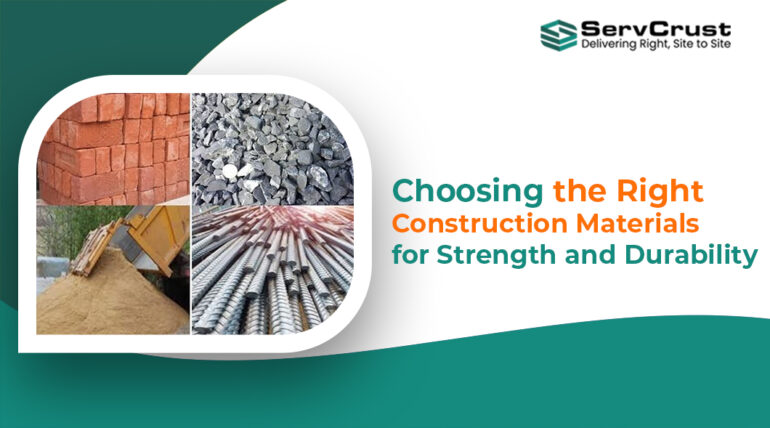
India’s construction sector is rapidly expanding, driven by urbanization and infrastructure growth. Selecting the right construction materials ensures strength, durability, and cost efficiency. High-quality materials improve safety, reduce maintenance, and enhance overall building performance.
Key Factors to Consider
When choosing construction materials in India, consider:
- Strength & Durability – Materials must withstand diverse climatic conditions, including extreme heat, monsoons, and seismic activity.
- Sustainability – Eco-friendly options like recycled aggregates and green cement help reduce environmental impact in fast-growing cities.
- Cost-Effectiveness – Affordable yet high-quality materials are essential for budget-conscious housing and infrastructure projects.
- Availability – Locally sourced materials lower costs and ensure timely construction, especially in rural and semi-urban areas.
- Maintenance – Low-maintenance materials extend the lifespan of structures in India’s demanding environment.
Best Materials for Strength and Durability in Indian Construction
Concrete & Ready-Mix Concrete
Concrete is widely used in Indian construction due to its durability. Ready-mix concrete (RMC) enhances strength and efficiency, making it ideal for large projects like highways, metros, and residential buildings.
Steel & Reinforced Steel
Steel provides tensile strength, while reinforced steel is essential for earthquake-resistant buildings, crucial in seismic zones like the Himalayan belt.
Stone Aggregates
Stone aggregates such as M-Sand, GSB, Gravel, and various-sized aggregates are vital for constructing strong foundations, concrete mixes, and road projects. With increasing restrictions on river sand mining, M-Sand (manufactured sand) is becoming a preferred alternative.
Bricks & Blocks
Traditional clay bricks, fly ash bricks, and AAC blocks are popular in India. Fly ash bricks, made from industrial waste, are cost-effective and eco-friendly, widely used in affordable housing projects.
Wood & Engineered Timber
While wood is not commonly used for structural purposes in India, engineered wood like plywood is popular for interiors, furniture, and modular construction.
Sustainable and Innovative Materials in India
As India moves towards greener construction, sustainable materials are gaining traction:
- Green cement – Reduces carbon emissions and enhances longevity, used in smart cities and eco-friendly buildings.
- Self-healing concrete – Ideal for infrastructure projects, reducing long-term maintenance.
- Recycled aggregates – Promotes a circular economy by utilizing construction and demolition waste.
Choosing the Right Supplier in India
A reliable building material supplier ensures high-quality products, competitive pricing, and timely delivery. Builders and developers should choose suppliers who comply with Indian standards like BIS (Bureau of Indian Standards) and IS codes for construction materials.
Conclusion
India’s construction industry demands strong, durable, and cost-effective materials. By selecting the right options, builders can enhance project longevity and sustainability. Choosing trusted construction material suppliers ensures better quality and efficiency, supporting India’s growing infrastructure needs.
